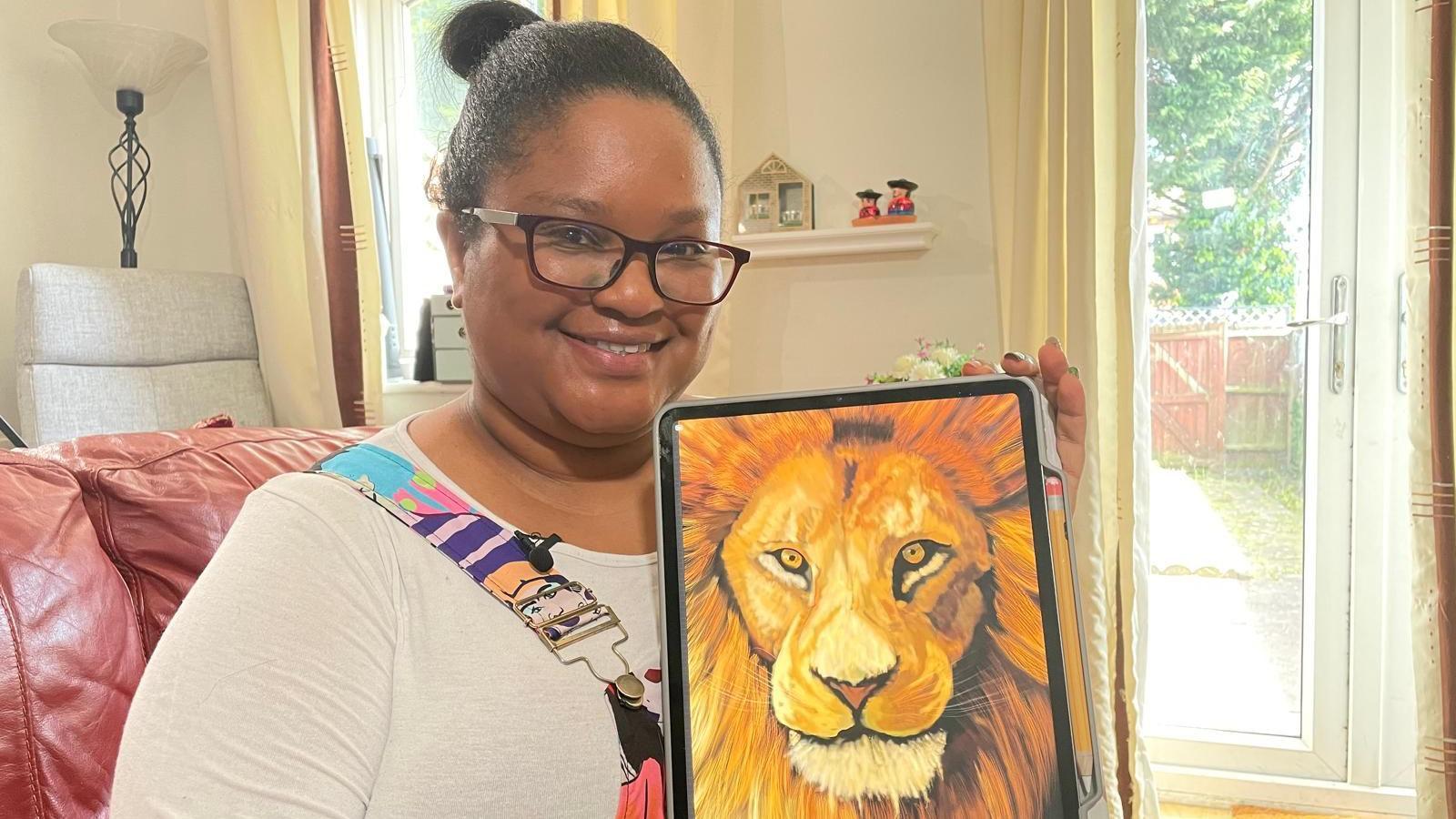'I felt like a prisoner waiting for sight loss help'

Bethany Brown said she waited more than six months to start her therapy.
- Published
Blind and visually impaired people are being left at risk because of delays to vital rehabilitation to allow them to learn to live with their disability, a charity said.
The Royal National Institute of Blind people (RNIB) said more than a quarter of councils in England have left those who need help waiting more than a year to be assessed and get support.
ŌĆ£It wasn't until I walked outside that it hit me. My sight is not coming back.ŌĆØ
Bethany Brown had just been diagnosed with optic neuropathy when she had those thoughts, a condition which meant the nerves between her eyes and brain were damaged.
Until then she had been looking forward to a girls' holiday, driving lessons and starting a degree in mental health nursing.
Instead she left the hospital appointment in 2018 feeling ŌĆ£life had come crashing downŌĆØ.
The 31-year-old, from Birmingham, needed to learn how to live life as a visually impaired person but faced a long wait.
Ms Brown uses her remaining sight to paint
When someone loses their sight they are supposed to have vision rehabilitation to help them regain their independence.
It includes learning how to use a cane, how to navigate a kitchen, use public transport and other skills.
The Local Government and Social Care Ombudsman sets a 28-day deadline for someone to start their therapy.
But Ms Brown said she waited more than six months.
She was referred for rehabilitation in May 2023 but had to wait until March for them to make contact.
ŌĆ£I was stuck in my house. When I went outside it felt like a whole different world," she said.
ŌĆ£Eventually, I just felt like a prisoner in my own home.ŌĆØ
The RNIB said the delays on getting rehabilitation were leaving visually impaired people "at risk"
When she received the rehabilitation, she said it helped her "get all my confidence back".
"One minute I was stuck in my house and I wouldn't go outside, I wouldn't interact with people. But now I'll go places," she said.
Ms Brown now uses her remaining sight to paint.
The first painting she did after her diagnosis was a lion as "it represents strength, courage, and bravery. I felt that these are things that I'm going to need".
The RNIB said long delays to vision rehabilitation were ŌĆ£leaving visually impaired people at riskŌĆØ.
More than a quarter of councils in England leave blind and partially sighted people waiting more than a year for a vision rehabilitation assessment and subsequent support, the RNIB said.
Some 86% of local authorities miss the 28-day recommended deadline, according to figures the charity obtained through freedom of information requests.
Long waits for support
In the East Midlands, not a single local authority met the target with patients in Nottingham and Nottinghamshire waiting an average of seven to 12 months to be seen.
Those in Leicester, Derbyshire and Leicestershire waited three to four months while Derby did not provide information.
In the West Midlands, only patients in Herefordshire started the training within the 28 days while those in Walsall, Staffordshire and Shropshire waited more than a year.
In Ms Brown's case, a Birmingham City Council spokesperson said they actively managed their waiting lists, sent letters to patients if there was a long wait for help and made them aware of charities which could help them in the meantime.
Suzanne Foxon said while she waited three months for her rehabilitation she had to rely on her husband for nearly everything
Three years ago, Suzanne Foxon, from Leicestershire, woke up blind after a brain haemorrhage.
She spent a week and a half in a coma and then was told she would be severely visually impaired for the rest of her life.
"I lost my driving licence, I'd lost my career. I lost my independence. I'd lost my purpose in life. I'd been a nurse for so long that I didn't know how to be anything else," Mrs Foxon said.
ŌĆ£I didn't even get to see my second grandchild's face. But he knows me now. That's the important thing.ŌĆØ
She had to wait three months to get her rehabilitation and said without it, she was unable to do anything for herself and needed her husband for nearly everything.
ŌĆ£The moment youŌĆÖre blind and disabled youŌĆÖre treated as if youŌĆÖre a burden. I used to be so independent and suddenly I was dependent on other people,ŌĆØ she added.
Leicestershire County Council was approached for a response.
The delays meant thousands of blind and partially sighted people were being stopped from living their lives to the full, the RNIB's Vivienne Francis said.
ŌĆ£A lack of support can leave patients at a higher risk of physical accidents and injuries - leaving many isolated and unable to engage in life," she added.
Follow ┤¾Ž¾┤½├Į West Midlands on , and . Send your story ideas to: newsonline.westmidlands@bbc.co.uk, external
More like this story
- Published14 March
- Published22 March
- Published10 March